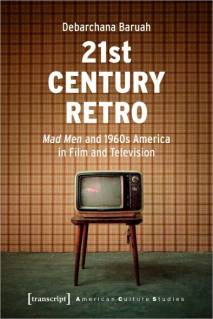|
|
|
Umschlagtext
Numerous contemporary televisual productions revisit the past but direct their energies towards history's non-events and anti-heroic subjectivities. Debarchana Baruah offers a vocabulary to discuss these, using Mad Men as a primary case study and supplementing the analysis with other examples from the US and around the world. She takes a fundamentally interdisciplinary approach to studying film and television, drawing from history, memory, and nostalgia discourses, and layering them with theories of intertextuality, paratexts, and actor-networks. The book's compositions style invites discussions from scholars of various fields, as well as those who are simply fans of history or of Mad Men.
Debarchana Baruah is a cultural theorist at the American Studies department, University of Tübingen. She completed her doctoral studies at the Heidelberg Center for American Studies, Heidelberg University and received her B.A., M.A., and M.Phil. degrees in English Literature from the University of Delhi. She is interested in US popular cultures, film and television, memory cultures, food cultures, and immigration histories. Rezension
Diese englisch-sprachige Medien-Untersuchung stellt am Beispiel der US-amerikanischen Fernsehserie "Mad Men", die von 2007-2015 in Episoden ausgestrahlt wurde (in Deutschland ab 2009 im Pay-TV-Seriensender FOX), die Frage, warum und inwiefern sich gegenwärtige Fernsehproduktionen der jüngeren Vergangenheit zuwenden (Mad Men spielt in den 1960er Jahren). So entsteht Erinnerungskultur durch Fernsehen. Im Mittelpunkt der Serie steht eine fiktive New Yorker Werbeagentur in den 1960er Jahren; im Titel ist ein Wortspiel enthalten: ad-Men sind Werbefachleute, daraus wird Mad Men (Verrückte). Im Mittelpunkt steht der ehrgeizige Werbefachmann Don Draper, ein kettenrauchender Frauenheld mit dunkler Vergangenheit. Die Serie sucht das Lebensgefühl und die Ästhetik der 1960er Jahre detailgenau wiederzugeben, die Handlung ist eng in den sozialen und kulturellen Kontext der Zeit eingebettet (Lebensstil, traditionelle Geschlechterrollen, wirtschaftlicher Aufschwung, Fortschrittsgläubigkeit etc.).
Dieter Bach, lehrerbibliothek.de Inhaltsverzeichnis
Acknowledgements 11
Introduction 13 The Irreverent 13 Temporal Relationality 15 Beginnings 17 21st Century Retro 21 Retro’s critics 22 Retro’s Proponents 23 Reorienting Retro 24 Mad Men 26 Layout 28 Part I Chapter 1: Retro 37 Post-Pinochet Retros 37 Identifying Retros 41 Post-Gaullist Rétro 44 Mad Men as 21st Century American Retro 47 The Place That Cannot Be 52 A Disregard for Categories 59 Chapter 2: History in Retros 67 1968 67 History as Metaphor 73 Solemn Histories 77 Boomer Memories 81 Generations in Mad Men 86 History of Film and Television in Retros 90 Part II Chapter 3: Television Memories and Intertextualities in Mad Men 99 Watching Television 99 Television in Mad Men 104 Memories in Serial Television 108 Pleasures of Retro’s Intertextualities 111 Mood 116 Counterpoint 121 Reframing Intertexts 124 Revival 127 Chapter 4: Mad Men and its Paratexts 133 “An Unsung Hero” 133 Special Features, Audio Commentaries, Fan-made Paratexts 137 Mad Men as Complex Retro 144 The Retro Aesthetic 153 Product to the Process 158 Part III Chapter 5: The Mad Men Network 165 Mad Men’s Cultural Footprint 165 Tracing Action 171 Creating Value 175 Set as Actor 183 Conclusion 197 Recap 197 Expanding the Frame 201 Futures 204 List of Mad Men Episodes Cited 207 Works Cited 213 |

 Bei Amazon kaufen
Bei Amazon kaufen